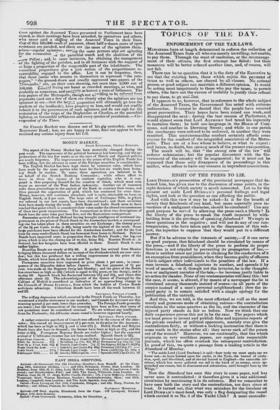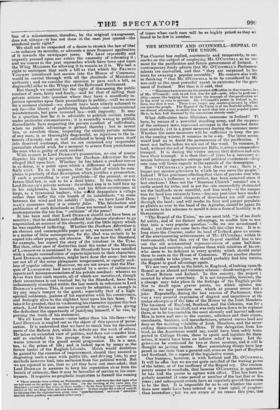RIGHT OF THE PRESS- TO LIE.
Loan DURHAM'S prosecution of' the provincial newspaper that de- famed-him, has given rise to the discussion -of some points, in the right decision of which society is much interested. Let us for the present' set aside Lord DITRHA51.'S personal feelings and legal rights, and look at the question as one affecting the public.
And with this view it may be asked—IS it for the benefit. of society that falsehoods of any kind, but more especially pure in- ventions of a malignant character, should- be circulated? Can any good purpose be served by allowing the press-such.a liberty? Is the liberty of the ' press to-speak the truth• impaired by with- holding-from it the privilege of speaking falsehood.? We-reply to these questions in the negative-; and will not do.any of our, con- temporaries, who have taken:part in- the discussion of.this sub- ject, the injustice to suppose that they would put in a different. answer: But if it be adverse to the interests of society,—if it can serve no good- purpose, that falsehood should be circulated by means of the press,—and if the liberty of the press to perform its proper functions is not crippled by preventing its propagation of lies,— there is neither sense nor-justice in claiming for the conductors of it an exemption from punishment, when they become guilty of offences which subject other individual's to-the penalties of the law. If -a man invents a falsehood. injurious to another,- and spreads it by word of mouth,7---or if,.though not the inventor, he is the thought-. less-or malignant narrator of the tale,he becomes.justly liable to for slander. None of our contemporaries will deny. this :but ' the case, it seems, is altered, if by:means of a newspaper the lie is circulated among thousands- instead of scores—in all parts of the' empire instead of a. manes personal neighbourhood; then the in- . jured.party is to remain satisfied. with a simple' apology flir the publication. of the untruth.
And this, we are told, is the most effectual as well as the most
manly and generous mode of obtaining redress—the contradiction. circulates in the same quarters as the lie, and the character of the . injured party stands as fair as before. Now we think that our daily experience proves this not to be the case. The papers which are most prone to invent and publish false and injurious reports of the private conduct of political opponents, scarcely ever give the contradiction fairly, or without a lurking insinuation that there is some truth' in the stories after all:- they never suck all the poison out of the wound:* Moreover, we see continually; that lies which originate in very. worthless papers, are copied into respectable ,journals, which too often. overtook the subsequent contradiction. In- proof-of this, we quote a -passage from a-leading article in the . Standard of Monday.
" The noble Lord (Lord Durham) is said—how truly we must again say we know not-,to have hoisted upon, his yacht, in the Tyne, the banner of confu- sion, spoil, and bloodshed, and of eternal hatred to England—the execrable. tri- colour, which has never polluted our soil in the hand of an enemy, never ap- proached our coasts, but in abasement and submission, until brought here by the Whigs."
Now the Standard has seen this story in some paper, and has never seen it contradicted : it therefore gives it a vast additional circulation by mentioning it in its columns. But.we remember to have seen both the story and the contradiction, ten days since at least. -It turned out, that what' was mistaken for the tricolour on Lord DURHAM'S mast-head, was only a flag designating the vessel which carried it as No. 3 of the Yacht Club t A mere contradic- tion of a misstatement, therefore, by the original transgressor, does not. always—it has not done, in the case just quoted—the slandered party right.* We shall not be suspected of a desire to stretch the law of libel —to enhance its severity, or advocate a more frequent application elf it towards the newspaper press. We have repeatedly and urgently pressed upon our rulers the necessity &reforming it ; and we concur in the just reproaches which have been cast upon the Whig Ministers for allowing it to remain as it is. We had a right to anticipate that such a bill as that which Sir FRANCIS VINCENT introduced last session into the House of Commons, would be carried -through with all the plenitude of Ministerial authority; and we consider the omission to pass such a bill, as disgraceful alike to the Whigs and the Reformed Parliament.
But though we contend for the right of discussing the public conduct of men, fairly and freely,—and for that of calling their private actions into question where they have a manifestly in- . furious operation upon their proceedings in publie,—still we never for a moment claimed—we should have been utterly ashamed to ask for—the liberty of publishing falsehoods—not unintentional misstatements, but pure invented lies—with impunity. It may be a question how far it is advisable. to publish certain truths under particular circumstances ; it is assuredly wrong to publish discreditable facts respecting the private conduct of individuals, ;when no public advantage is gained 'thereby ; 'but to invent
lies, or circulate them, respecting, the strietly private actions isf any man, is so thoroughly disgraceful, so injurious to the in- terests of society, and so well calculated to bring the press. itself
into deserved contempt, that we are surprised any respectable journalists should wish for a moment to screen from punishment the man who is guilty of such conduct.
With respect to Lord DURHAM'S prosecution, no one of course disputes his right to prosecute the Durham Advertiser for the alleged libel upon him. Whether he has taken a prudent course in so doing, is a point upon which a difference of opinion may fairly exist. To us it appears, that the libel of which he com- plains is precisely of that description which justifies a prosecution, if such a proceeding is ever justifiable—if the present, or any future libel-law, is not to be a dead letter. It has reference to Lord DURHAM'S private actions : its evident aim is to hold him up to his neighbours, his tenantry, and his fellow-countrymen at large, as a tyrannical bashaw, who wiltild depopulate a village rather than suffer the vile breath of its inhabitants " to come between the wind .and his nobility :" lastly, we have Lord Dui/- erases assurance that it is utterly false. The fabrication and .publication of such falsehoods as-these are termed by some of our contemporaries the too-free " criticism" of the press! • It has been said that Lord.DURHAIII should not-have been so
sensitive; that he should' have suffered his obscure slanderer to go
unpunished, on account of his obscurity, and the little injury which he was capable.of.intlictihgs . Whether the Durham Advertiser is an obscure and contemptible paper or not, we cannot tell ; and it is a matter of little. consequence, for the' libel- was certain to be copied into other papers, not obscure. We see how 'the Standard, for example, has copied the story of the tritolour. -in the Tyne. But then, other men of distinction (and the name of the Marquis Of LANSDOWNE. is mentioned by. the Standardy nave been satisfied with a simple contradiction of reports injurious to their characters. Lord DURHAM, questionless, might have done the same: but men are not all of the same phlegmatic temperament, or. equally reck- less of popular odium.' Moreover, we are not aware that the Mar- quis of LANSDOWNE had been assailed by a series of calumnious reports-and misrepresentations-of his private. conduct: whereas no fewer than four such reports, all.of which are mentioned, though their correctness is not vouched. for; by the Standard, have -been industriously circulated within the last month in reference to Lord DURHAm's actions. This,• it must surely be admitted, is enough to try any man's temper to the quick; especially that of a high- spirited nobleman, jealous of his reputation with his countrymen, and feelingly alive to the slightest taint upon his fair fame. We take it for granted; that in vindicating his character against-this last attack, Lord DURHAM means to proceed by action ; thus giving the defendant the opportunity of justifying himself, if lie can, by proving the truth of his statement.
We all know the reason—none better. than his libellers—why Lord DURHAM is singled out as the objeCt of this species of perse- cution. It is understood that we-have.to thank him for the sound parts of the Reform Act, while its defects are the work of others. He takes an extended view of politics, and does not consider him-
self as excluded by his peerage from taking an active and warm interest in the grand social progression. He is a man,
too, in the prime of life; and is looked upin by many as the future leader of the English Liberals. .Much would doubtless be gained by the enemies of improvement, should they succeed in disgusting such a man with public life, and driving him, by any methods however find, into seclusion from the political world. But we are rejoiced to see, that as yet they have not succeeded; that Lord. DURHAM is anxious to keep his reputation char from the breath of calumny, that it may be hereafter of service to his coun- trymen. It requires no prophetic inspiration to foretell the coming
• These remarks were written on Wednesday morning, ancliwere lbunded upon what we had read on the subject op to that time... On the evening of the same day, the Standard repeated the flag story, in these words—" Solar from -having la en refuted, the stories of the two flags have not even been denied." It'then varies the male of assault, byalleging that the explanations given. were " toreatAmsficaterl," and thak Lord:par- hamhas never publicly contradicted either story." of. times when such men will' be, as highly Orited,as they wi found to be few-in number.

















 Previous page
Previous page